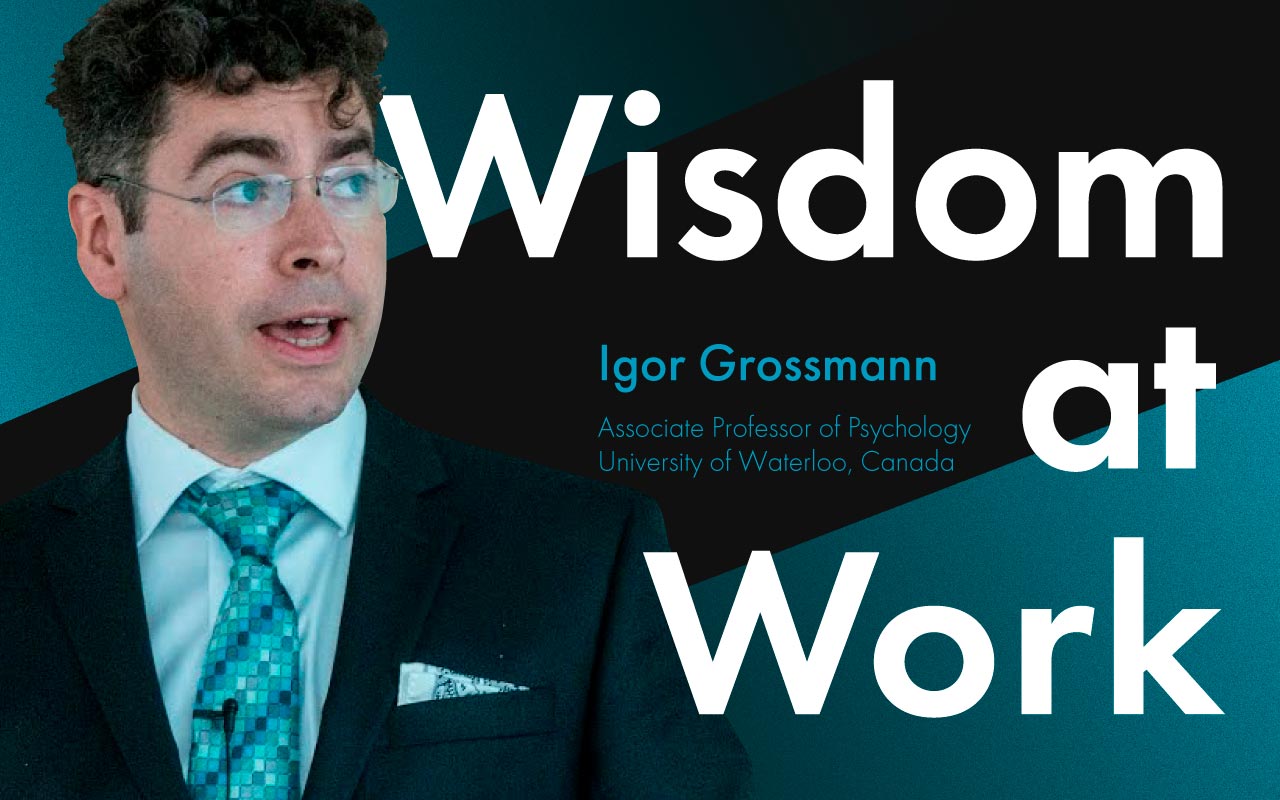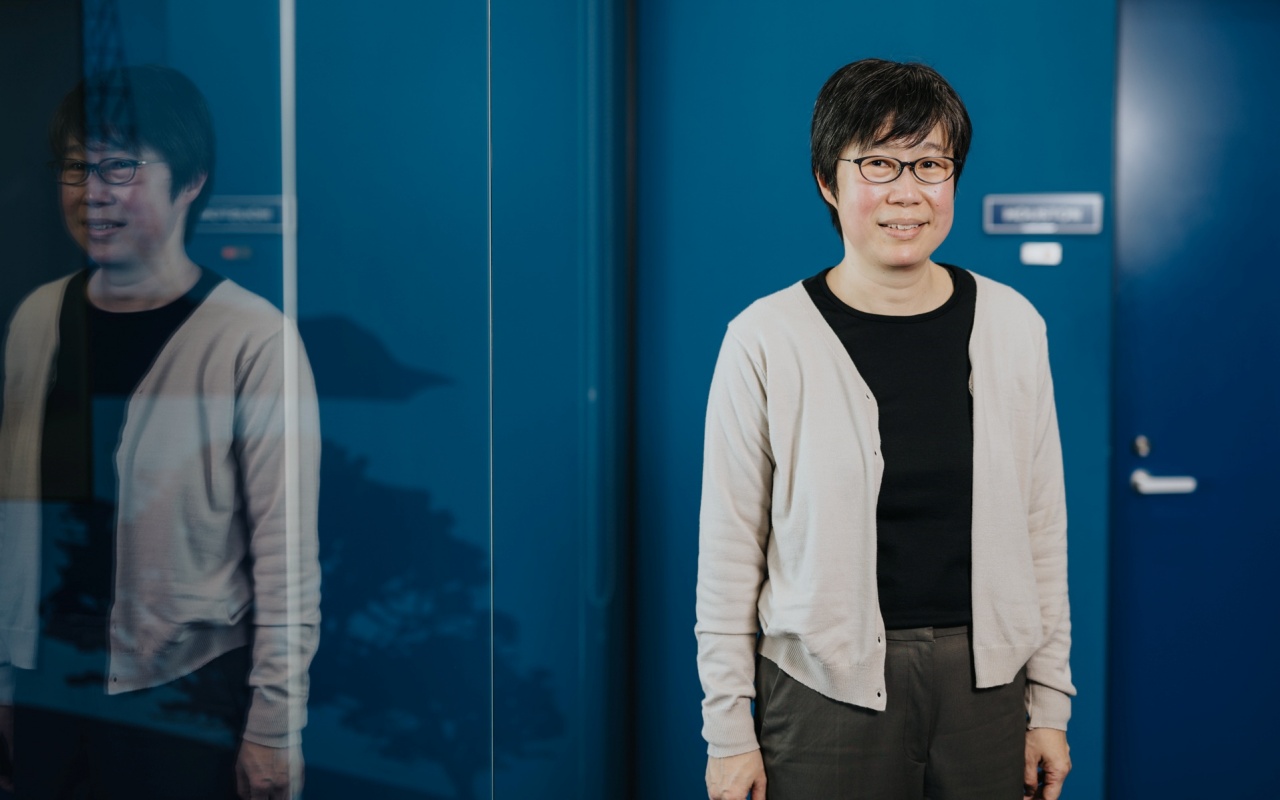Wisdom Isn't What You Think, It's How You Think

As a wise man once said, "What does wisdom mean, anyway?" It's a trait revered by cultures around the world, yet still shrouded in mystery and misconceptions. Does wisdom come naturally with age? Is it enough to rack up a lot of life experience? Is wisdom an individual pursuit, or a collective one? Are our workplaces conducive to developing wisdom?
To find answers—and perhaps become a bit wiser in the process—we sat down with award-winning wisdom researcher and associate professor of psychology at the University of Waterloo, Igor Grossmann. He helped break down wisdom into its psychological components, and gave some advice on how to nurture our own burgeoning wisdom.
Thinking about thinking
Alex: I took some psychology classes back in university, but not a single one of my teachers talked about your area of expertise: wisdom. What is wisdom from a psychological standpoint, and how is it different from knowledge or experience?
Igor: Generally, when people talk about wisdom—whether in philosophy or psychology—they focus on good or sound judgment. Here, the perspective that my lab follows is to say that wisdom concerns how people deal with practical issues in everyday life.
This perspective isn't new. You can find a similar approach in the works of Aristotle, as well as in East Asia, for example in the writings of Lao Zi or Confucius. What's interesting is that many philosophical perspectives relate to two sets of processes that have recently come into the limelight in psychology.
The first set concerns metacognition—in other words, thinking about thinking, but also reasoning about feelings and the goals you want to achieve. Wisdom is in part the ability to focus on how to get a better perspective on yourself and your situation, as well as how to practically resolve problematic situations and move ahead.
The second set involves your moral aspirations. I use the term "aspirations" because oftentimes you may want to do good, but can't due to the constraints of the situation, or due to a conflict between different moral pursuits. In challenging situations, wisdom can often involve figuring out how to balance between the willingness to cooperate with others on the one hand and the pursuit of truth on the other hand.

Igor Grossmann was born in the Soviet Union, and grew up in Ukraine and Germany. He became interested in how people make sense of complex social challenges at a young age, and has since chosen to focus his work on exploring the interplay of sociocultural factors for wisdom. Igor is an associate editor of the journal Social Psychological and Personality Science. He is the founder of the behavioural and social science Forecasting Collaborative, and co-hosts the "On Wisdom Podcast." He is also an award-winning associate professor of psychology at the University of Waterloo.
Igor: The formulation of wisdom as sound judgment through the lens of metacognition and moral aspirations is different from knowledge or experience. Knowledge is not enough to be wise. You can have a lot of knowledge but no way of applying it in your life, like having a brain with the storage of a supercomputer but still being incapable of smooth social interaction with other people. That's why you need those metacognitive processes.
As for experience, the problem is that it's not necessarily beneficial. Experiences can be traumatic and lead to psychological problems. There is also very domain-specific experience, which doesn't translate to other areas in life. If you're very experienced at using a certain form to fill out your taxes, that experience may no longer be useful the day you have to use a different form.
The question then becomes: When put into a challenging life situation, does the person with experience fare better than a random person pulled off the street? I don't know, it depends on the type of experience.
Alex: Does that mean that wisdom is not domain specific? Once you're wise, you're generally wise across domains?
Igor: Ancient Greek philosopher Aristotle emphasized that wisdom is about figuring out what strategies fit what situations. Theoretically, metacognitive processes should be applicable across all domains. However, that doesn't mean you'll be able to respond similarly to every situation. The likelihood you will show wisdom depends on a lot of factors, like prior exposure, experience, socialization, upbringing, how you understand the situation in front of you, and so on.
Alex: Is wisdom defined the same way around the world?
Igor: There are different flavors, some cultures emphasize certain things more, and the terms vary. For example, the technical terms Christians use to talk about wisdom, focusing on virtues, is very different from Buddhist or Confucian traditions. However, if you break the terms down into their psychological components, you'll find that the focus on metacognitive processes occurs in most cultures.
Wisdom as a social process
Alex: What distinguishes a wise person from an unwise person? Is it just a matter of how efficiently they perform metacognitive tasks?
Igor: Wisdom is not about efficiency. A fighter pilot is very efficient at retrieving information and executing complex tasks, but that doesn't make them wise. Metacognition is about taking the time to look beyond snap judgments, figuring out how to consider multiple interests, where to look for unknown factors, and figuring out how to balance them.
Instead, what differentiates a wise person from an unwise person is their process of reasoning. They don't rely on a single, top-down algorithm to solve all problems. They reflect in a less algotithmic, top-down fashion, and instead consider a breadth of perspectives, including outside perspectives. The quality of that reflection is a key criterion of wisdom.
Alex: How can people become wiser?
Igor: If I knew the answer to that question, I'd probably be a billionaire guru! (laugh)
We've only made serious empirical research advances in the last 30 years, and hence there is more speculation than rigorous scientific research on this topic. One thing we've noticed is that some people develop wisdom over time through repeated exposure to challenging situations. Those people learn to take more of a back seat, gain some distance—almost like a distant observer—and from that position they can improve their metacognitive process, leading to a more sound reflection. If you focus on that improvement, you can train yourself over time.
Alex: How about in a company setting?
Igor: In a company setting, you can emphasize group-related activities. There is research showing you're more likely to display wisdom in a social context. If you track people over time, you'll find that those who interact more with coworkers or have people they care about will be wiser. The reason we see this is likely because being in a group confronts us with different mindsets; different viewpoints that challenge our preconceptions.
Another point we've noticed is that you can encourage building wisdom by having mentor-mentee pairs. People do that quite a lot in the workplace, but the focus is often on the mentee. I think it's also interesting to focus on the mentor, because when you're in a teaching role, you tend to shift your perspective and start thinking of issues differently. A similar thing happens when you become a parent. There's a benefit to observing others making decisions rather than doing so yourself.
Finally, a useful idea is to embrace the fact that you will fail. This is a radical idea for businesses. I'm not talking about the Silicon Valley way of wearing failure as a badge of honor and bragging about it—that would be antithetical to what I have in mind! What I mean is admitting your limitations, being willing to learn from them, and sharing with your group the wrong turns you took, as well as strategies more likely to lead to success.
Alex: I had always associated wisdom with a lot of work on the self, so it's interesting that you mention all these social elements!
Igor: We had this debate among wisdom scholars: Can you be wise if you're stranded alone on a desert island like in the movie "Cast Away," with Wilson the anthropomorphized volleyball as your only friend? My position is that actually, you can, but only as long as you have Wilson to talk to!
Humans are social animals that evolved to communicate with each other, coordinate our activities, and plan for the future together. If you put us in a box and ask us to make decisions with no consideration for social context, that's contrary to our capabilities as social animals.
Alex: Does that mean that in my company, if I want to become wiser, I need to interact with my coworkers more?
Igor: Probably, unless you have your own Wilson. (laugh)
Older doesn't necessarily mean wiser
Alex: Is wisdom a function of age? Is it even possible for a young person to be wise?Igor: We don't know; we have little to no evidence that can tell us whether or not wisdom is a function of age. The problem is that if you look at two different age groups, it's impossible to know if the differences you're observing are because of their age itself, or because of the culture they grew up in.
We know from research that most cognitive abilities decline with age, starting when you're in your twenties. Crystallized intelligence—which is the knowledge you build up over time—is something you can keep accumulating into your seventies or eighties provided you stay healthy, but that will decline eventually as well.
For wisdom, we don't know. Adults are definitely more likely than children to engage in metacognitive processes, but we don't have studies that track the same person over a long period of time. We can only infer based on our observations of people who grew up in different cultures and different eras.

Igor: We also see bias depending on how the study is conducted. For example, there are studies from Germany that asked younger and older Germans to solve a problem. If the problem was formulated in a way that was easy to understand for all ages, both groups performed the same. However, if you take the exact same problem and formulate it in a way that doesn't resonate with the daily experience of the older group, then they perform much worse. So older adults have more experience, but that's not necessarily helpful.
Unless you are repeatedly exposed to the same type of experiences, the strategies you developed in reaction to those experiences may not be accessible, and the memories of those experiences will decay over time.
Alex: So an older person saying, "This is how we used to do things back in my day," is not a sign of wisdom, but a sign of experience?
Igor: Yes, it's them sharing a different type of experience. It still has value though, because that older person is bringing ideas from a different culture—based on the culture they grew up in—which younger people wouldn't have considered.
Keep in mind, though, that "old age" is a very strange term. If you look at historical narratives from hundreds of years ago about old age—and this is true not just in North America and Europe, but also China, Japan and Korea—they think of old age as people in their thirties and forties, because people didn't live as long. If you managed to make it to 40, you would've lived a long time, survived a lot, while also still being in good physical and mental condition. That's why when you see old texts saying that wisdom comes with age, you have to be careful, because that often refers to a very different age group.
A culture of intellectual humility
Alex: You mentioned earlier that the mentor-mentee relationship was one way of developing wisdom. Is there a case for intergenerational collaboration in the workplace?
Igor: I think any type of diversity is good in the workplace, since it brings more perspectives. Young adults typically are more spontaneous, quicker, and generate lots of arguments and brainstorming ideas. However, they're not as good as older adults at trimming ideas, selecting, and integrating them together.
As I mentioned before, an older person coming in and saying, "Why aren't you doing things this way?" can be disruptive. It's especially problematic if that person is trying to push old templates that are no longer relevant. However, that can also be positive, since the younger person may have forgotten something, or taken something for granted.
The mere fact of asking the question and starting a conversation is beneficial. Having intergenerational collaboration in that sense is really important.
Alex: What are your thoughts on seniority?
Igor: I'm not a fan. I think it is morally important to respect the elderly, but confusing respect and appreciation with power can be dangerous and can stifle creativity.
Also, people in positions of power may be less likely to admit their failures. That's also an obstacle to wisdom, since an important aspect of becoming wise is intellectual humility.
In the workplace, we should be looking to facilitate a culture of humility. Not in the sense of being agreeable and avoiding conflict, but rather encouraging, sharing and accepting different viewpoints. Obviously, that depends on the company, the job, the tasks, and so on. Overall though, encouraging intellectual humility can be very powerful.
Alex: What would be a preferable alternative to seniority? Perhaps a flat structure, or something more rotational?
Igor: A rotational structure. As somebody born in the Soviet Union on the day of the October revolution, I'm very sensitive about flat structures. They don't work, because some people will always strive for power, so you need some kind of leadership. However, that leadership doesn't have to be top-down, and it doesn't have to be set in stone.
In that sense, a rotational system could be quite advantageous. Allow people from different ages and backgrounds to access important positions. It's also more fun that way, since you can also learn more and broaden your horizon.
Alex: That's interesting, because it brings to mind another big debate within the corporate world about specialization versus generalization. Is being a generalist more favorable to developing wisdom?
Igor: It's not one or the other. One of my favorite authors from the 20th century was another Eastern European expat—the hugely influential intellectual Isaiah Berlin. He wrote a famous essay classifying previous intellectuals like Tolstoy and Shakespeare as either hedgehogs or foxes. The hedgehog was the specialist, who would see the world through the lens of a single idea. The fox was the generalist, who believed in the importance of a wide variety of experiences. So which one is better? Well, you need a bit of both, depending on the situation.
For wisdom, you also need a bit of both. You need the ability to bring matters into focus, but also to be aware of diverse perspectives.
Wisdom isn't something you are, it's something you do
Alex: Is there a downside to wisdom? Does it hamper creativity, or make people stubborn, for example?
Igor: I don't think there's a serious downside. To be creative, you need metacognitive processes, so in that sense creativity is a part of wisdom. The ability to look at things from different perspectives and consider different viewpoints are key ingredients for creativity.
You will also be less stubborn, since another part of wisdom is the ability to cooperate, compromise, and balance things together. This means wise people are generally more agreeable, not just socially but also intellectually, since they are open to the idea that the opposite of the truth may also be true. Sometimes, this tendency may be somewhat of a downside.
One thing that can be a disadvantage is that wise people are more deliberate. They take more time to reflect on everything and wait, which can be a virtue, but can also be a problem when a spontaneous decision is necessary.
If you define wisdom as the ability to figure out which strategy best fits every situation, then by that definition there is no downside, because a wise person would figure out any downsides and adapt their strategy accordingly. However, this is not a practical definition from an empirical standpoint, as it can lead to tautological, non-falsifiable claims.
Instead, I think it's important to recognize that some aspects of metacognition or morals may be relevant at times, and sometimes the same aspects of metacognition may be totally irrelevant and other features may be relevant. Will being intellectually humble help you ride a bike or pay your taxes? Probably not. Are moral aspirations important when driving a car? Perhaps if you're on a cusp of making a life or death decision, but hopefully that doesn't happen too often.
That being said, metacognitive processes can be exhausting. If you practice a lot, you make them more automatic, but on average they take more effort than just using a rule of thumb to make your decisions. To be wise, you need to step out of your comfort zone and think carefully, which is energy intensive. That's perhaps the biggest drawback of wisdom. You have to use it wisely!
Alex: So wisdom isn't something you have, it's something that you do?
Igor: Yes. There's a common misconception that you are either wise or unwise. That may be the case for some individuals, but they are remarkably few. My research shows that it's more of a gradation, and can vary dramatically across different situations.
We do see general tendencies. Some people are more likely than others to engage in metacognitive processes. Those who engage more may on average be wiser. But just because someone shows more wisdom on average doesn't guarantee they will be wiser in a given situation. It's probabilistic, not deterministic.
Article by Alex Steullet. Edited by Alex Steullet, Ade Lee and Mina Samejima. Photographs courtesy of Igor Grossmann.
Writer

Alex Steullet
Alex is the editor in chief of Kintopia and part of the corporate branding department at Cybozu. He holds an LLM in Human Rights Law from the University of Nottingham and previously worked for the Swiss government.
Photographer

Ayami Takano
Ayami is part of the creative team in the product promotion section of Cybozu's business marketing department. While creating designs and visual content for the company, she also does freelance work on publications and in graphic design.




